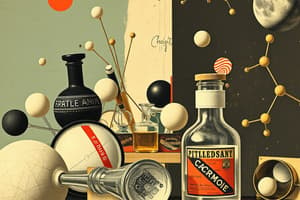Podcast
Questions and Answers
Which of the following are characteristics of organic compounds? (Select all that apply)
Which of the following are characteristics of organic compounds? (Select all that apply)
- Marked by the presence of carbons (correct)
- Different states: gas, liquid, solid (correct)
- Mainly consist of carbon to hydrogen bonds (correct)
- Non-volatile and not inflammable
Inorganic compounds are characterized by the presence of carbon.
Inorganic compounds are characterized by the presence of carbon.
False (B)
What is the study of carbon called?
What is the study of carbon called?
Organic chemistry
Hydrocarbons are organic compounds that consist of only carbon and ______ atoms.
Hydrocarbons are organic compounds that consist of only carbon and ______ atoms.
Match the following types of hydrocarbons to their descriptions:
Match the following types of hydrocarbons to their descriptions:
What is an isomer?
What is an isomer?
Which of the following describes organic compounds? (Select all that apply)
Which of the following describes organic compounds? (Select all that apply)
Functional groups control how a molecule reacts.
Functional groups control how a molecule reacts.
Which of the following are characteristic properties of organic compounds? (Select all that apply)
Which of the following are characteristic properties of organic compounds? (Select all that apply)
Inorganic compounds typically contain carbon.
Inorganic compounds typically contain carbon.
What is organic chemistry the study of?
What is organic chemistry the study of?
What is an alkane?
What is an alkane?
The general formula for alkanes is __.
The general formula for alkanes is __.
Which of the following compounds are unsaturated hydrocarbons? (Select all that apply)
Which of the following compounds are unsaturated hydrocarbons? (Select all that apply)
Name a compound that contains a carbon-carbon triple bond.
Name a compound that contains a carbon-carbon triple bond.
What are hydrocarbons?
What are hydrocarbons?
Match the following types of organic compounds with their descriptions:
Match the following types of organic compounds with their descriptions:
What is isomerism?
What is isomerism?
Flashcards are hidden until you start studying
Study Notes
Organic Compounds
- Composed primarily of carbon atoms.
- Characterized as inflammable and highly volatile.
- Exist in various states: gas, liquid, and solid.
- Typically insoluble in water.
- Predominantly contain carbon-to-hydrogen bonds.
- Commonly found in living organisms.
- Examples include carbohydrates and lipids.
Inorganic Compounds
- Lack carbon atoms in their structure.
- Non-volatile and not inflammable.
- Typically found in solid state.
- Generally insoluble in water.
- Predominantly occur in non-living organisms.
Organic Chemistry
- Defined as the study of carbon-based compounds.
- Valence electrons are responsible for bonding.
- Carbon can form four covalent bonds with other carbons or non-metals.
Hydrocarbons
- Organic compounds consisting solely of carbon and hydrogen.
Isomerism
- Refers to compounds with the same chemical formula but different structural configurations.
Types of Organic Compounds
- Aliphatic: Carbon chains that can be linear or branched.
- Aromatic: Compounds containing aromatic rings.
Alkanes
- Saturated hydrocarbons with only single carbon-carbon bonds.
- Represent the simplest form of hydrocarbons.
Alkenes
- Unsaturated hydrocarbons characterized by carbon-carbon double bonds.
Alkynes
- Unsaturated hydrocarbons identified by carbon-carbon triple bonds.
- Known as the acetylene series.
Alkyl Groups
- Derived from alkanes, having one less hydrogen atom.
- Also referred to as haloalkanes when hydrogen is replaced by halogen atoms.
Hydrocarbon Derivatives
- Without Carbonyl: Includes halocarbons, alcohols, ethers, amines.
- With Carbonyl: Encompasses aldehydes, ketones, carboxylic acids, esters, and amides.
Functional Groups
- Specific groups of atoms within molecules that determine chemical reactivity and properties.
Organic Compounds
- Composed primarily of carbon atoms, which are covalently bonded to hydrogen and sometimes other elements.
- Generally inflammable, highly volatile, and exist as gases, liquids, or solids.
- Usually insoluble in water but soluble in organic solvents.
- Important examples include carbohydrates and lipids.
- Formed from hydrocarbons, which only contain carbon and hydrogen.
- Exhibit isomerism, where compounds share the same molecular formula but differ in structure.
Inorganic Compounds
- Lack carbon atoms, making them distinct from organic compounds.
- Non-volatile and non-inflammable; exist primarily in solid state.
- Soluble in water, with a few exceptions; generally remain insoluble in organic solvents.
- Predominantly found in non-living entities.
Organic Chemistry
- Focuses on the study of carbon and its compounds.
- Organic compounds are integral to all living organisms, derived mainly from hydrocarbons.
Hydrocarbons
- Categorized into three types based on bonding: alkanes (single bonds), alkenes (double bonds), and alkynes (triple bonds).
- Aliphatic hydrocarbons are further divided into straight or branched chains and do not possess benzene groups.
- Aromatic hydrocarbons contain benzene rings or derivatives.
Functional Groups
- Groups of atoms that determine the chemical behavior of organic compounds.
- Types of functional groups include alcohols, ethers, amines, aldehydes, ketones, carboxylic acids, esters, and amides.
Characteristics of Organic Compounds
- Combust readily to produce carbon dioxide and water.
- Generally less stable when exposed to heat compared to inorganic compounds.
- Form complex molecules, demonstrating varied reactivity.
- Presence of isomers allows multiple structural forms for the same molecular formula.
Types of Hydrocarbons
- Alkanes: Saturated hydrocarbons with single carbon-carbon bonds. General formula: CnH2n+2.
- Alkenes: Unsaturated hydrocarbons with carbon-carbon double bonds.
- Alkynes: Unsaturated hydrocarbons containing carbon-carbon triple bonds.
Aromatic Compounds
- Benzene: The fundamental aromatic compound.
- Naphthalene: Composed of fused benzene rings, known for its distinctive aroma.
- Anthracene: Contains three fused benzene rings, featured in rigid structures.
Molecular Geometry
- Explores three-dimensional shapes of organic molecules and their influence on properties.
- Recognizes the significance of bonding patterns in forming stable compounds through covalent, ionic, and hydrogen bonds.
Studying That Suits You
Use AI to generate personalized quizzes and flashcards to suit your learning preferences.




